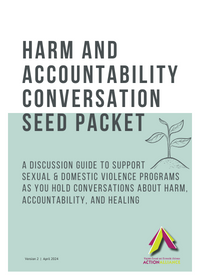Resources Library: Intervention & Services
Start a Search:
Feelings and Emotions List
This handout was provided by Santa Sorenson from the Richmond Peace Education Center at the workshop titled "Conflict Resolution" at the Virginia Department of Social Services Office of Family Violence Promising Practices conference on September 16, 2013.
Framing the Issues: Looking at the Opioid Epidemic in the Context of Trauma and Domestic Violence
This timely and important webinar produced by National Resource Center to Enhance Safety of Native Women and their Children will provide an overview of what is known about the opioid epidemic and will focus on the specific concerns of Indian communities and tribal domestic violence programs and shelters. It will lay the foundation for the exploding opioid epidemic and will examine the intersections between trauma, domestic violence and the opioid epidemic and explore innovative approaches to addressing these complex issues.
Click here to view the webinar.
From Hurt to Hope: A Child Sexual Abuse/Assault Advocacy Guide
From Hurt to Hope: A Child Sexual Abuse/Assault Advocacy Guide: A guide from WCSAP (Washington Coalition of Sexual Assault Programs) that provides foundational knowledge of best practices for advocates working with youth and their caregivers. The guide includes an overview of Child sexual Abuse/assault, general advocacy, medical advocacy, legal advocacy, system's coordination, information and referral, and crisis intervention.
Harm and Accountability Conversation Seed Packet: A Discussion Guide to Support Sexual & Domestic Violence Programs as You Hold Conversations About Harm, Accountability, and Healing

The Harm and Accountability Conversation Seed Packet is a guide to help people working in sexual and domestic violence programs begin to think more broadly about what accountability can and should look like, not only after harm is committed, but also in all aspects of their lives: our relationships, families, workplaces, and communities.
The 95-page document includes 17 exercises and concrete steps for folks working in sexual and domestic violence agencies who want to expand their knowledge and practice of effective accountability.
Examples of activities in the discussion guide include:
• Responding to harm caused by individuals vs. systems
• How shame can block accountability
• What is the “victim/perpetrator binary” and how does it impede our work?
• Accountability and punishment Venn diagram
• What are the obstacles to accountability and how to overcome them?
• How to give a genuine apology
• Healing and accountability wheel
The discussion guide is designed to be a toolkit for holding conversations in your workplace, communities, and families. It was written to spark discussions about what paths exist for promoting accountability and how we can practice it in our own lives to model it for our friends, families, coworkers, and communities.
The guide asks us to consider what systems for supporting accountability currently exist, and to imagine new ways of approaching our responses to harm…approaches that not only reinforce accountability but also strengthen connection and healing.
High Risk Screening for Women of Childbearing Age
This handout was provided by Martha Kurgans, from the Department of Behavioral Health and Developmental Services, at the workshop titled "How Community Service Boards and Domestic Violence Programs Can Help Each Other" at the Virginia Department of Social Services Office of Family Violence Promising Practices conference on September 16, 2013.

